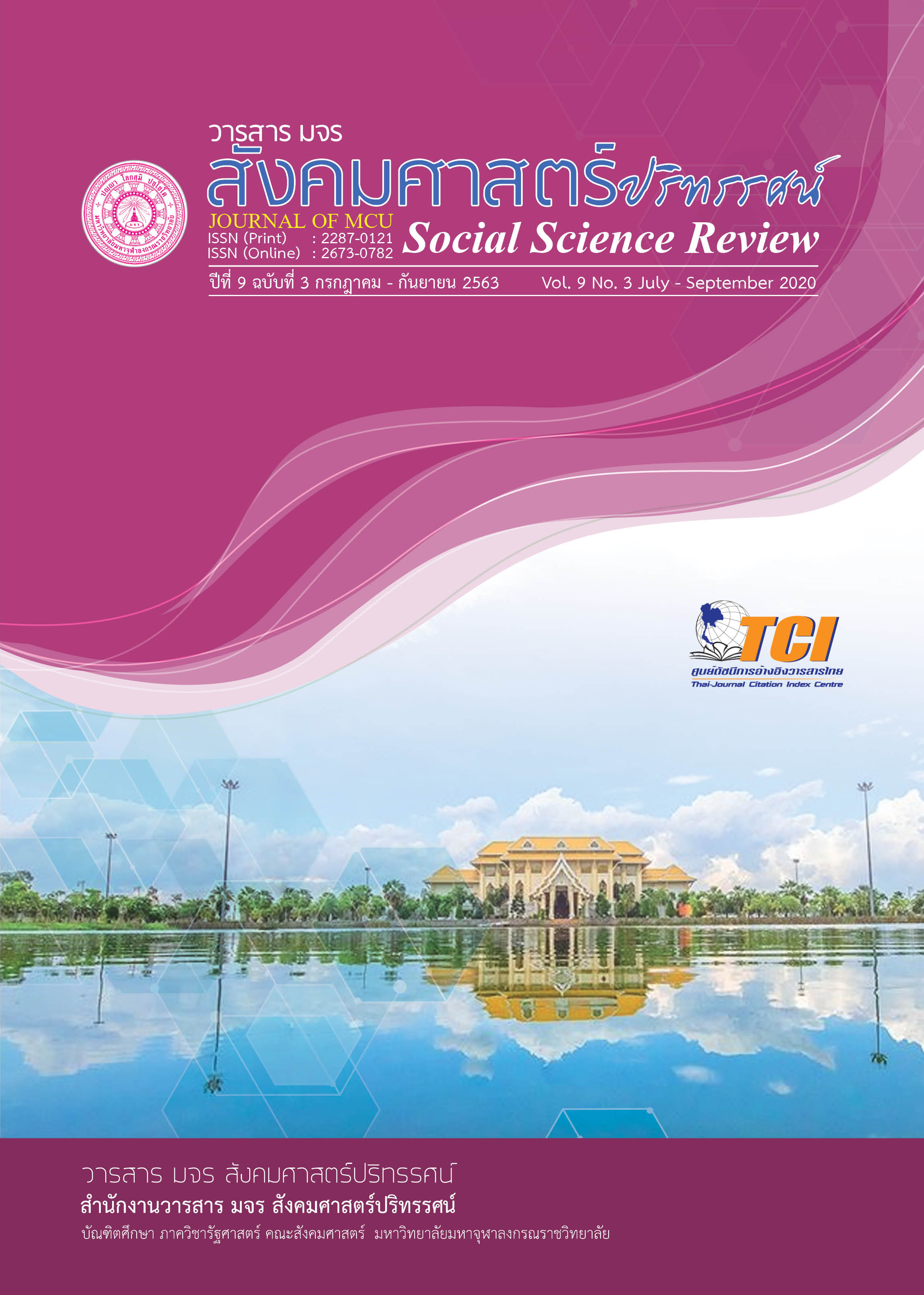การบูรณาการภาครัฐและพลังชุมชนภายใต้ปรัชญาเศรษฐกิจพอเพียง กรณีศึกษา อำเภอคอนสวรรค์ จังหวัดชัยภูมิ
คำสำคัญ:
การบูรณาการจัดการภาครัฐ, ความเข้มแข็งของชนชน, ปรัชญาเศรษฐกิจพอเพียงบทคัดย่อ
บทความวิจัยนี้มีวัตถุประสงค์เพื่อศึกษาบริบทของอำเภอคอนสวรรค์ จังหวัดชัยภูมิ ปัจจัยที่ทำให้เกิดปัญหาอุปสรรค และแนวทางการจัดการเรื่องการบูรณาการการจัดการภาครัฐกับชุมชนสู่ความเข้มแข็งภายใต้ปรัชญาเศรษฐกิจพอเพียง เป็นการวิจัยเชิงคุณภาพ โดยการศึกษาเอกสาร สัมภาษณ์เชิงลึก การสนทนากลุ่ม และการสังเกตแบบไม่มีส่วนร่วม พบว่า ในส่วนบริบทของชุมชนในปัจจุบันภาครัฐเข้ามาบูรณาการให้การสนับสนุน ให้ความรู้ ให้คำแนะนำ ตามหลักปรัชญาเศรษฐกิจพอเพียง ส่วนปัจจัยที่ทำให้เกิดปัญหาอุปสรรคต่อการเพิ่มขีดความสามารถชุมชนภายใต้ปรัชญาเศรษฐกิจพอเพียง 1) ขาดการสนับสนุนในด้านระบบฐานข้อมูลข่าวสาร 2) ขาดการสนับสนุนในด้านการถ่ายทอดความรู้และการจัดการความรู้ 3) ขาดการสนับสนุนในด้านระบบความสัมพันธ์และความเอื้ออาทร (4) ขาดจิตสำนึกเพื่อประโยชน์ส่วนรวม จิตสาธารณะ ส่วนแนวทางการเพิ่มขีดความสามารถชุมชนภายใต้ปรัชญาเศรษฐกิจพอเพียง คือ 1) แนวทางด้านการปรับตัวให้ทันต่อการเปลี่ยนแปลง 2) แนวทางด้านการปรับปรุงฟื้นฟูสภาพแวดล้อมให้เหมาะสม 3) แนวทางด้านการดำรงอยู่อย่างมั่นคง มั่งคั่งและยั่งยืน (4) การจัดตั้งศูนย์เครือข่ายแหล่งเรียนรู้ชุมชน 5) ศักยภาพขององค์กรชุมชนท้องถิ่น 6) ความร่วมมือทุกภาคส่วน 7) การมีส่วนร่วม 8) การจัดการเครือข่ายความรู้
เอกสารอ้างอิง
โกวิทย์ พวงงาม. (2553). การจัดการตนเองของชุมชนและท้องถิ่น. กรุงเทพฯ: บพิธการพิมพ์.
กัญญารัตน์ กิ่งก่ำ. (2555). ปัจจัยที่เอื้อต่อความสำเร็จในการพัฒนาชุมชนตามแนวทางปรัชญาเศรษฐกิจพอเพียงของชุมชนบ้านม่องหินแก้ว ตำบลวังพร้าว อำเภอเกาะคา จังหวัดลำปาง (วิทยานิพนธ์ปริญญารัฐประศาสนศาสตรมหาบัณฑิต). เชียงใหม่: มหาวิทยาลัยเชียงใหม่.
ณรงค์ เพ็ชรประเสริฐ. (2550). ธุรกิจชุมชนเส้นทางที่เป็นไปได้. กรุงเทพฯ: บรัท เอ็กเปอร์เน็ทจำกัด.
นภาภรณ์ หะวานนท์ และคณะ. (2550). ทฤษฎีฐานรากในเรื่องความเข้มแข็งของชุมชน. กรุงเทพฯ: สำนักงานกองทุนสนับสนุนงานวิจัย 6 สกว. 7.
นเรศ สงเคราะห์สุข. (2541). จากแนวคิดสู่การปฏิบัติ. เชียงใหม่ : สำนักงานโครงการพัฒนาที่สูงไทย–เยอรมัน.
ไผท วงศ์อนุตรโรจน์. (2544). กระบวนการสร้างและพัฒนาเครือข่ายทางสังคม : กรณีศึกษาบ้านหนองขาว อำเภอท่าม่วง จังหวัดกาญจนบุรี (วิทยานิพนธ์ปริญญารัฐศาสตร์มหาบัณฑิต) กรุงเทพฯ: มหาวิทยาลัยธรรมศาสตร์
พลเดช ปิ่นประทีป. (2542). สู่ความเป็นไทยด้วยพลังของท้องถิ่นข้อเสนอกรอบแนวคิดเพื่อจัดแผนฯ 9. กรุงเทพฯ: สถาบันชุมชนท้องถิ่นพัฒนา.
วรวุฒิ อินทนนท์. (2556). สถาบันการเรียนรู้เพื่อปวงชน ปฏิบัติการในชีวิตประจำวันของชุมชนกับความเป็นสาธารณะ (วิทยานิพนธ์ปริญญารัฐประศาสนศาสตรดุษีบัณฑิต สาขารัฐประศาสนศาสตร์) อุบลราชธานี: มหาวิทยาลัยอุบลราชธานี.
วิรัช วิรัชนิภาวรรณ. (2550). การบริหารจัดการตามแนวทางเศรษฐกิจพอเพียงในชุมชน. รัฐสภาสาร, 55, 29-34.
วิทยา จันแดง. (2555). การพัฒนารูปแบบการบริหารจัดการชุมชนเข้มแข็งตามแนวปรัชญา เศรษฐกิจพอเพียง ในเขตจังหวัดภาคกลางตอนบน (ดุษฎีนิพนธ์ปริญญารัฐประศาสนศาสตรดุษฎีบัณฑิต). ปทุมธานี : มหาวิทยาลัยราชภัฏวไลยอลงกรณ์ในพระบรมราชูปถัมภ์.
สาวิณี รอดสิน. (2554). ชุมชนเข้มแข็ง : กรณีศึกษาบ้านปางจำปี ตำบลห้วยแก้ว อำเภอแม่ฮอด จังหวัดเชียงใหม่ (วิทยานิพนธ์ปริญญารัฐประศาสนศาสตรมหาบัณฑิต สาขาวิชารัฐประศาสนศาสตร์). นครปฐม: มหาวิทยาลัยศิลปากร.
เสรี พงศ์พิศ. (2552). วิถีสู่ชุมชนพอเพียง. กรุงเทพฯ: สำนักพิมพ์พลังปัญญา.
________. (2554). เศรษฐกิจพอเพียง เกิดได้ถ้าใจปรารถนา. กรุงเทพฯ: เทียนวรรณ.
เสน่ห์ จามริก. (2527). นโยบายกลวิธีการมีส่วนร่วมของประชาชนในการพัฒนาชุมชน. กรุงเทพฯ: ศูนย์ศึกษานโยบายสาธารณสุข มหาวิทยาลัยมหิดล.
สำนักงานคณะกรรมการพัฒนาการเศรษฐกิจและสังคมแห่งชาติ. (2560). ร่างยุทธศาสตร์ระยะ 20 ปี. สืบค้น 20 กันยายน 2560, จาก www.nesdb.go.th
อภิชิต ดวงธิสารและอนันต์ เกตุวงศ์. (2560). การจัดการเพื่อสร้างชุมชนเข้มแข็งภายใต้ปรัชญาเศรษฐกิจพอเพียง : กรณีสถาบันการเรียนรู้เพื่อปวงชน จังหวัดชัยภูมิ. วารสาร มจร สังคมศาสตร์ปริทรรศน์, 6(2), 347-358.
ดาวน์โหลด
เผยแพร่แล้ว
รูปแบบการอ้างอิง
ฉบับ
ประเภทบทความ
สัญญาอนุญาต
ลิขสิทธิ์ (c) 2020 วารสาร มจร สังคมศาสตร์ปริทรรศน์

อนุญาตภายใต้เงื่อนไข Creative Commons Attribution-NonCommercial-NoDerivatives 4.0 International License.
เพื่อให้เป็นไปตามกฎหมายลิขสิทธิ์ ผู้นิพนธ์ทุกท่านต้องลงลายมือชื่อในแบบฟอร์มใบมอบลิขสิทธิ์บทความให้แก่วารสารฯ พร้อมกับบทความต้นฉบับที่ได้แก้ไขครั้งสุดท้าย นอกจากนี้ ผู้นิพนธ์ทุกท่านต้องยืนยันว่าบทความต้นฉบับที่ส่งมาตีพิมพ์นั้น ได้ส่งมาตีพิมพ์เฉพาะในวารสาร มจร สังคมศาสตร์ปริทรรศน์ เพียงแห่งเดียวเท่านั้น หากมีการใช้ภาพหรือตารางหรือเนื้อหาอื่นๆ ของผู้นิพนธ์อื่นที่ปรากฏในสิ่งตีพิมพ์อื่นมาแล้ว ผู้นิพนธ์ต้องขออนุญาตเจ้าของลิขสิทธิ์ก่อน พร้อมทั้งแสดงหนังสือที่ได้รับการยินยอมต่อบรรณาธิการ ก่อนที่บทความจะได้รับการตีพิมพ์ หากไม่เป็นไปตามข้อกำหนดเบื้องต้น ทางวารสารจะถอดบทความของท่านออกโดยไม่มีข้อยกเว้นใดๆ ทั้งสิ้น





